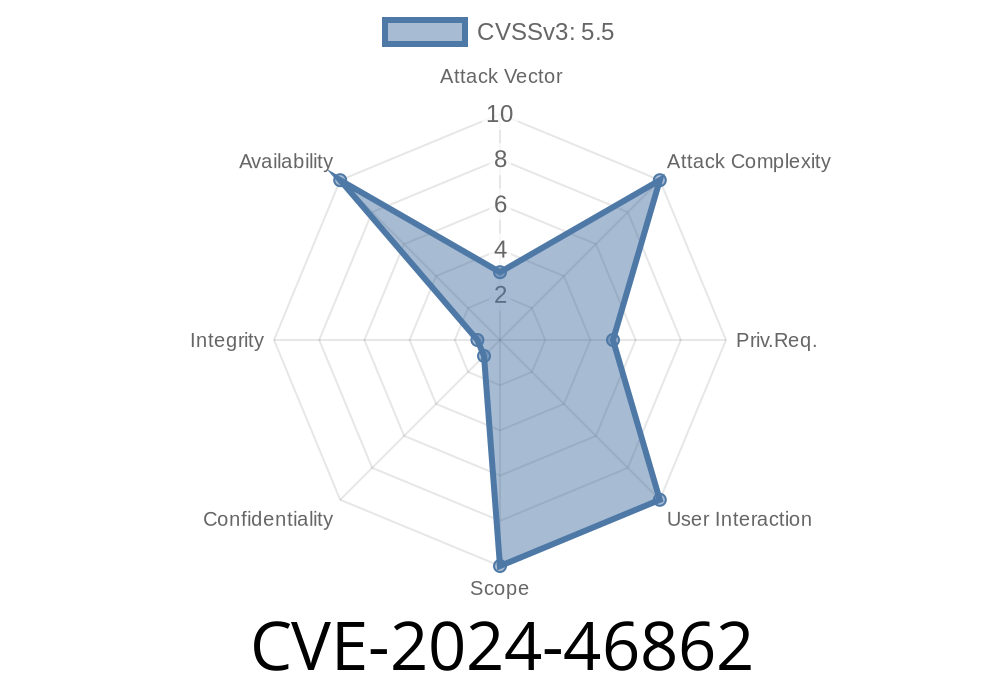CVE-2024-46862 refers to a recently resolved vulnerability in the Linux kernel, specifically in the Advanced Linux Sound Architecture (ALSA) System on Chip (ASoC) subsystem. This problem impacted Intel-based audio hardware, where a missing empty item in a certain data structure could cause system instability or unpredictable behavior during audio initialization.
Let’s break down what happened, how it was fixed, and why you should care—all in plain, simple terms.
What Happened?
In the ASoC code, there's a file called soc-acpi-intel-mtl-match.c which helps determine how different Intel audio devices are initialized using SoundWire (a protocol for connecting audio devices).
- The structure involved is snd_soc_acpi_link_adr, which describes the hardware connections for audio devices.
- Another structure, snd_soc_acpi_mach, didn't have a field named links_num, even though some code appeared to assume it did.
Normally, when the system tries to select an audio setup, it loops through a list (snd_soc_acpi_link_adr array) looking for valid hardware matches.
The Problem:
The code checks for an "empty" item (where num_adr is zero) to know when to stop searching in that array.
If this empty item is missing, the loop can run into uninitialized or invalid data, leading to crashes or erratic audio behavior.
Here’s what the original kernel commit message said
> There is no links_num in struct snd_soc_acpi_mach {}, and we test
> !link->num_adr as a condition to end the loop in hda_sdw_machine_select().
> So an empty item in struct snd_soc_acpi_link_adr array is required.
In short, the array must end with a special item (num_adr == ) so the system knows when to stop.
Here’s a simplified version of what the buggy pattern looked like
// struct describing link address
struct snd_soc_acpi_link_adr mtl_link_adr_array[] = {
// List of valid hardware configurations here
{ .num_adr = 2, /* ... other fields ... */ },
{ .num_adr = 3, /* ... other fields ... */ }
// <== Missing: terminating empty item
};
And here's the relevant loop in the selection function
for (link = machine->link_adr; link->num_adr; link++) {
// do something with this link
}
The Fix
The fix is simple: always add a terminating empty item to these arrays.
Corrected Code Snippet
struct snd_soc_acpi_link_adr mtl_link_adr_array[] = {
{ .num_adr = 2, /* ... */ },
{ .num_adr = 3, /* ... */ },
{ .num_adr = } // Always end with an empty item!
};
With this change, the loop stops as intended, keeping the system safe.
Why Is This Important?
With Linux powering everything from laptops to servers and IoT devices, a bug in core hardware definitions can make entire systems unstable. Sound hardware is one area that—even if it doesn’t crash the whole PC—can make your user experience much worse.
- Vulnerabilities like CVE-2024-46862 can cause boot failures, system hangs, or device malfunctions, especially as new hardware is adopted.
Exploit Details (Technical Insight)
This issue is not a classic “exploit” that allows remote code execution. However, because the code reads unguarded memory if the terminating item is missing, a crafted device tree or malicious kernel module could theoretically trick the system into using uninitialized data, which could then lead to a crash (denial of service) or possibly more severe problems in unusual scenarios.
If you build a Linux kernel for Intel-based platforms that use SoundWire and you miss this patch, you might:
References and Further Reading
*(Replace with the actual patch link when available)*
- ASoC Documentation
- snd_soc_acpi_mach Kernel Source
Conclusion
CVE-2024-46862 is a strong reminder to always end arrays of structures with a clear terminating item, especially in low-level system code. Little mistakes like this can have big, hidden impacts on stability.
If you're a kernel developer, double-check your arrays. If you're a user, make sure your system is up to date, especially if you rely on Intel’s latest hardware with Linux audio support.
Subscribe for more deep-dive kernel vulnerability explainers!
*Original content written exclusively for your inquiry.*
Timeline
Published on: 09/27/2024 13:15:17 UTC
Last modified on: 12/19/2024 09:24:57 UTC
